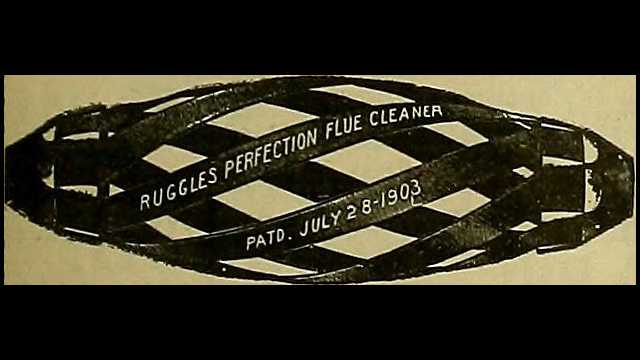By Sterling McGinn
Throughout Newberry’s long history, there has been an accumulative list of memorable and locally famous people. Machinist and inventor, Reginald S. “Reg” Ruggles was one of them.
There are still residents of Luce County who recall visiting the intelligent and sometimes witty gentleman at his old shop, which itself was an interesting place. Overhead line shafts with leather pulleys operated his equipment, which made for a fascinating site, especially for younger people.
Although not a native to the area, he spent a good number of years right here in Newberry operating the machine shop on Dollarville Road across from the cemetery. His former shop is the present site of P. M. Small Engine Repair, and his old residence still stands a few doors down.
Originally from Oshkosh, Wis., Ruggles was born on October 16, 1869. He and his family moved to Manistique in the mid-1870s when he was a young boy. His family was among the first settlers in that area, home to only 27 families at the time.
Ruggles eventually went into the machinist trade and invented a device that made him a decent living. His first machine mill was in Batavia, Illinois.
While residing in Batavia, he patented the Ruggles Perfection Flue Cleaner on July 28, 1903. The cleaner or scraper, was spiral in design and was manufactured in different sizes.
The angled metal bands on the exterior of the unit cut the thick soot, which accumulated in steam engine boiler flues. The device was attached to a long rod and inserted into the flue for cleaning. One of his biggest orders was for 50,000 cleaners at one time.
He continued to manufacture his invention until the patent expired in 1920. Ruggles relocated to Luce County around 1917.
Other earlier inventions included a device designed to attach to a bicycle, allowing for the rider to travel along railroad tracks. A popular and dangerous contraption, known as a velocipede, was already on the market.
He also came up with ideas for a potato picker and a cream can cleaner, but Ruggles didn’t have the money to patent those items, he claimed, because he was spending too much money on his courtship.
Prior to moving to Dollarville Road, Ruggles lived on a farm about 10 miles west of Newberry. His wife, the former Florence Chapin, was a schoolteacher and taught in Escanaba, Manistique and with the Newberry school system for many years.
Some of his close Newberry area friends included James F. Goldthorpe and Edwin Duflo, who built the stone chimney at Ruggles’ house.
He continued to work in his shop daily, even into his early 90s. The elderly man worked with his lathes and drill presses even if work didn’t come in.
He always said he had to live to be 100, because he had contracts to complete that would keep him busy past the age of 100.
Ruggles never tasted alcohol or smoked and never weighed over 136 pounds. He claimed being active and tinkering kept him alive and out of the cemetery, which was directly across from his place. Ruggles liked his side of the street much better.
Ruggles was a bit hard of hearing later in life, but read without wearing glasses. According to a 1960s Oshkosh Northwestern article, Ruggles forgot to wear his glasses once while he was reading, so he figured out he didn’t need them.
He subscribed to several newspapers to keep up on current events, and read the Farm Journal for 40 years. He canceled the subscription at the 40th year because he felt that was long enough.
While not working in his shop, Ruggles periodically wrote to former friends in Oshkosh and Manistique. He did this with a typewriter due to a case of palsy in his hands. He usually wrote between two to five letters per day to more than 90 different friends.
He enjoyed occasional road trips to Oshkosh to seek the city’s old-timers and refresh his remarkable memory. Ruggles liked to reminisce about his childhood days in the city, which included the Oshkosh Fire of 1875.
He also remembered following donkey carts to hear the animals bray, and the landmark oak tree where he played as a boy.
The years finally caught up with Ruggles and forced him to retire from his machine shop. Following the death of his wife Florence in the early 1960s and difficulties with his eyesight and palsy, he moved into a rest home in Traverse City.
Though he was not living back home, Ruggles kept busy with his correspondence and reading. He also jogged around the rest home for daily exercise.
Ruggles died January 29, 1966, at the age of 97 following a brief illness. At the time of his death, he was residing in the Solem Nursing Home in Traverse City.












